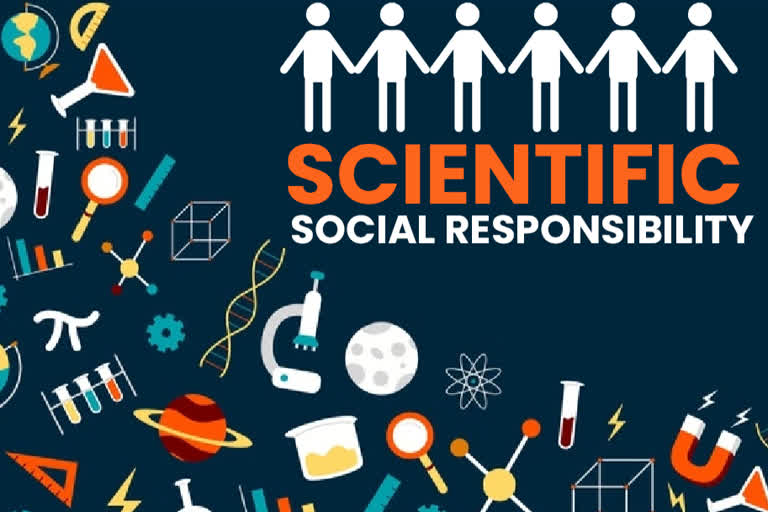Hyderabad: India is probably the first country in the world contemplating the implementation of a Scientific Social Responsibility (SSR) Policy along the lines of Corporate Social Responsibility (CSR).
The SSR intends to encourage scientific institutions and individual scientists in the country to actively engage in science outreach activities to connect science with the society for achieving better social goals. SSR is the convergence of scientific knowledge with a social conscience. It is about the ethical obligations of knowledge workers in the field of science and technology (S&T) to 'give back' to the less scientifically endowed communities, for the greater social impact of science and technology.
This ambitious draft policy for public consultations (9th September 2019) is built upon some of the earlier related policies, like, Scientific Policy Resolution 1958, Technology Policy Statement 1983, Science and Technology Policy 2003 and Science Technology and Innovation Policy 2013. However it goes a little further and proposes more practical provisions to make institutions and individual scientists more socially responsible; to enable them to give back to the society more, considering their own works are hugely supported by taxpayers’ money.
The government hopes that a better science interaction between science and the society at large would have significant implications for the new initiatives like Transformation of Aspirational Districts, Make in India, Swachh Bharat and Digital India, leading to more inclusive growth and development.
SSR could also trigger more of social entrepreneurship and start-ups, impacting the S&T ecosystem and society at large. This policy would complement and supplement the current efforts of institutions in a systematic and sustainable manner.
READ: 2020: Top Smartphone Brands in India
There are a variety of activities and programs envisaged in the document. It includes lectures by professional scientists in schools and colleges and even in the media, to inspire the younger generation to get interested in the study of the sciences. This is something India needs above all else. Mentoring, internship, scientific exhibitions, museums and displays by S&T institutions et al are also envisaged.
Other activities include sharing scientific and technological infrastructure with schools and colleges, developing skills through training and workshops; helping apply scientific solutions to local problems of environment, ecology, health, hygiene. Such activities would help find digital solutions for local problems augmenting incomes; simplifying Scientific and Technological literature in simple local language and disseminating through social media, and writing general articles and give interviews for popularising science and technology; training faculty on higher-end skills of S&T.
Translating key research problems and results into popular science articles, interviews and posts on social media; conducting awareness building training workshops and programs for livelihood generation, should go a long way in also improving the country’s scientific temper, etc.
As a first step towards implementing SSR, a national digital portal is envisaged through which societal needs requiring scientific interventions are collated and made available to the relevant SSR stakeholders, in addition to providing a platform for reporting of SSR activities.
How will the SSR be implemented?
There are a few strategies envisaged. All Central State Government Ministeries would plan and strategise their SSR in accordance with their respective mandates and goals. Every knowledge institution would prepare its implementation plan for achieving its SSR goals. All knowledge workers would be sensitised by their institutions about their ethical responsibility to contribute towards the society and achievement of national developmental and environmental goals. Every knowledge worker would be expected to contribute at least 10 person-days of SSR per year.
There would be an SSR monitoring system in each institution to assess institutional projects and individual activities. An annual SSR report would be published, appropriate indicators for monitoring of SSR activities pertaining to input, process, output and outcomes for institutions as well as individuals will need to be developed and the impact would be measured. Individual SSR activities will be supported with adequate budgets and will be given due weightage for performance assessment of the knowledge worker and finally. No activity will be allowed to be outsourced by the institutions.
Resources required for the implementation of SSR activities would include, apart from financial budgets, human resources, materials and infrastructure. To help raise the required resources three different schemes are envisaged such as, funding per activity (the SERB model); a fixed percentage of the project budget; and depending upon the SSR activities proposed in the project proposal, the evaluating committee could recommend the SSR component of the project grant.
The implementation of this policy is expected to usher in the power of S&T to solve societal problems, especially those of the marginalized sections of society, thus transforming the lives of the lower socio-economic segments of the population in the country.
READ: Science and Tech Weekly Wrap-Up
Advantages of SSR
Some of the expected benefits of SSR include: Expanding the domain of science and its benefits to a wider base of communities; encouraging students’ interest in S&T through closer handholding and nurturing; creating an opportunity for cooperation and sharing of S&T resources available at senior institutions for researchers in universities and colleges and skill development training and up-gradation of scientific knowledge.
It would also help MSMEs, startups and informal sector enterprises to increase their productivity; facilitate scientific intervention in rural innovation; empower women, disadvantaged and weaker sections society through scientific interventions along with identifying best practices and success models on SSR for replication with a multiplier effect in the country. SSR would facilitate actions towards addressing Technology Vision 2035 Prerogatives and Sustainable Development Goals (SDGs) of the country, like water, ecology, health and livelihood.
In a country with a low track-record of systematic traditions of science and technology and a low level of scientific temper, Scientific CSR is an idea whose time has come. But as always, good intentions are easier to nurture than good implementation. One hopes the implementation of this excellent idea will match its intent.
READ: New implants to help detect and prevent brain seizures



